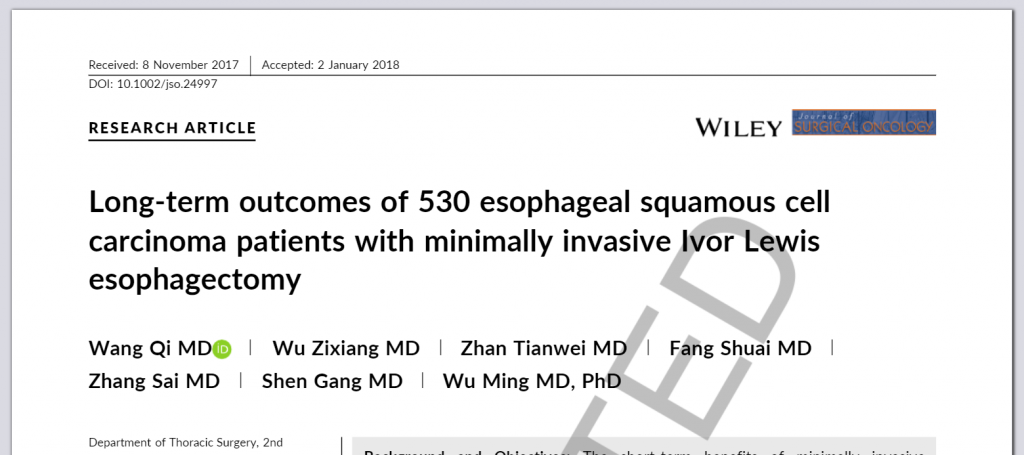
A group of researchers in China have lost a 2018 paper after whistleblowers informed the journal that the authors had misreported their data.
The paper, “Long‐term outcomes of 530 esophageal squamous cell carcinoma patients with minimally invasive Ivor Lewis esophagectomy,” appeared in the Journal of Surgical Oncology, a Wiley publication. It has been cited five times, according to Clarivate Analytics’ Web of Science. The researchers were affiliated with Zhejiang University, in Hangzhou.
According to the abstract:
The short-term benefits of minimally invasive esophagectomy (MIE) Ivor Lewis were proved, but 6-year outcomes in esophageal squamous cell carcinoma (ESCC) patients remain unclear. We sought to investigate perioperative outcomes, quality of life (QOL), survival and impact of adjuvant therapy in ESCC patients who underwent MIE Ivor Lewis.
We conducted a retrospective review of 530 ESCC patients treated with MIE Ivor Lewis from 2011 to 2016.
But the paper caught the attention of a group familiar with the hospital’s caseload, who contacted the journal with their concerns.
Stephen Sener, the editor in chief of the journal, told us:
On May 30, 2020, I received a credible allegation [from a group of whistleblowers] that the number of cases done in the operating rooms was far fewer than the number reported in the manuscript. The allegation included a notarized document from the medical records department validating the actual number of cases done during the time of the study.
I immediately asked the senior author of the article to explain the possibility that the number of reported cases significantly exceeded the actual number of cases, without referring to the whistleblower identity or the medical records document. The senior author replied that he wanted the article retracted. We notified the other authors that the article was going to be retracted, but we did not receive any replies from them.
According to the retraction notice:
The retraction has been agreed following concerns raised that the number of patients operated on was considerably lower than the number of patients reported in the article. When asked to provide documentary evidence of the operations performed, the authors confirmed the reported discrepancy and requested to retract their article.We emailed Wu Ming, the senior author of the paper and the executive vice chair of thoracic surgery at Zhejiang University, for comment but have not heard back.
We note — for those editors and publishers who insist that retractions must take months or even years — that from whistleblower allegation (May 30) to retraction (July 18) was just seven weeks.
Like Retraction Watch? You can make a tax-deductible contribution to support our work, follow us on Twitter, like us on Facebook, add us to your RSS reader, or subscribe to our daily digest. If you find a retraction that’s not in our database, you can let us know here. For comments or feedback, email us at [email protected].
The same group of authors had an interesting Erratum issued not long ago, here. Although the paper they aimed to correct was not the 2 under question, it was a relevant paper on similar topics of the same surgery.
https://www.thieme-connect.com/products/ejournals/abstract/10.1055/s-0040-1713385
This Erratum aimed to correct one sentence in the original paper.
https://www.thieme-connect.de/products/ejournals/abstract/10.1055/s-0036-1593408
And it goes “In the third line of the para[graph] under section Materials and Methods the phrase, “in our department” has been corrected as “in our department and collaborative departments”.”
Basically, it looks like that the correction was issued to resolve the concern over the number of cases reported in their this and other studies that might have exceeded the actual case load of that department/hospital. However, by looking at their original paper before the “correction”, the description was:
“From January 2011 to September 2014, 109 patients without neoadjuvant treatment underwent planned MIE-Ivor Lewis in our department, with a volume of more than 200 esophagectomy annually. All the operations in this study were performed by one surgeon, who performed annually over 100 cases of conventional esophagectomy during the last 15 years. ”
That opens a couple of possibilities:
1. One of the authors must be associated with more than one department/hospital. But none of the listed authors came from “collaborative departments”; Or,
2. The cases reported by the authors were not their own cases but from another single super surgeon who was not included as a co-author; Or,
3. Simply the Erratum was not actually a correction but, who knows?